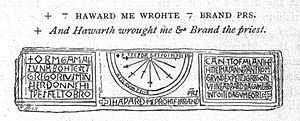Kirkdale, North Yorkshire facts for kids
Kirkdale is a beautiful valley in North Yorkshire, England. It's part of a bigger area called Bransdale. A stream called Hodge Beck flows through Kirkdale, starting from the moors near Cockayne. This stream eventually joins the River Dove and then the River Rye, which flows into the Vale of Pickering.
A special type of rock called Corallian Limestone is found in the hills around Kirkdale. This rock acts like a giant sponge, forming an aquifer. An aquifer is an underground layer of rock that can hold and let water flow through it. Because of this, much of the water from Hodge Beck actually goes underground! During dry summer months, you might even see the riverbed looking empty because most of the water is flowing hidden beneath the ground.
Kirkdale is also famous for its bone cave. This cave was once a den for ancient animals. Scavengers, like hyenas, would drag the remains of other animals into the cave. Even today, many old bones can still be found inside!
History of Kirkdale
Even though there isn't a village in Kirkdale today, it was once a very important place. It was the center of a large ancient parish, which is like a very old church district.
St Gregory's Minster
The Saxon church of St Gregory's Minster stands right by the river. It was built in the year 1055, on the site where an even older church once stood. This church is special because it has an 11th-century sundial with an inscription written in Old English. A sundial is an old device that tells time by the position of the sun's shadow.
The name "Kirkdale" actually comes from this church! It was first recorded in the Domesday Book, a famous survey from 1086. The name comes from the Old Norse words kirkja dalr, which means "church valley."
Old Townships
The ancient parish of Kirkdale included several smaller areas called townships. These were:
- Beadlam
- Bransdale Westside
- Muscoates
- Nawton
- North Holme
- Skiplam
- Welburn (which included the church itself)
- Wombleton
In the 1800s, North Holme was moved to a different parish called Great Edstone. Later, in 1866, all these townships became their own separate civil parishes.
Images for kids
 | Stephanie Wilson |
 | Charles Bolden |
 | Ronald McNair |
 | Frederick D. Gregory |




